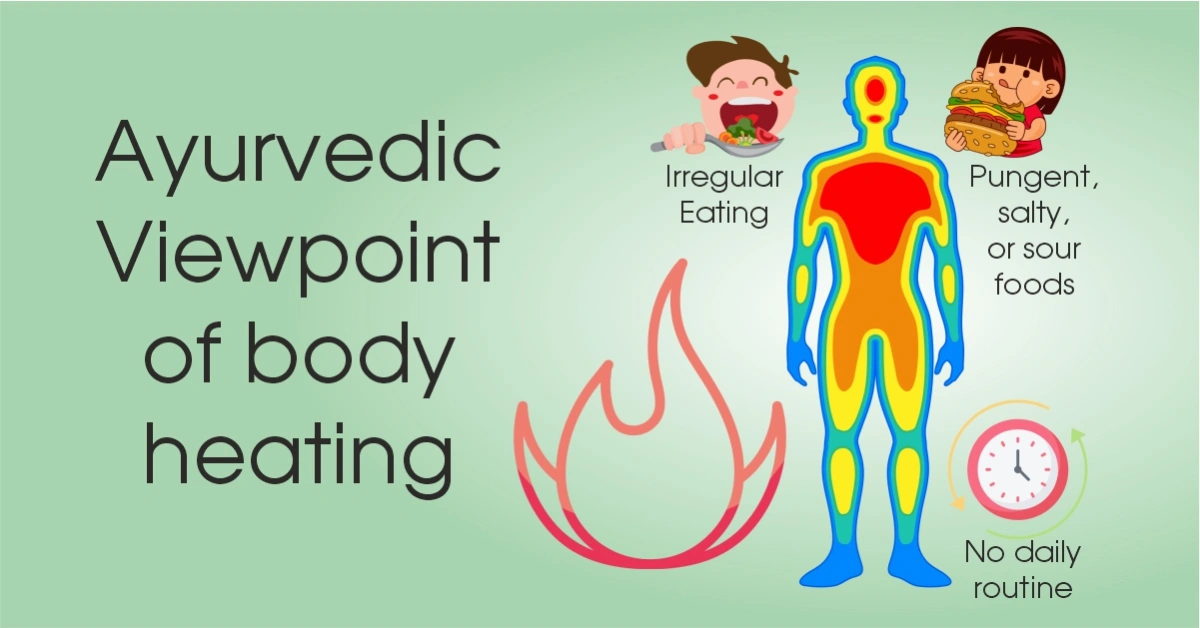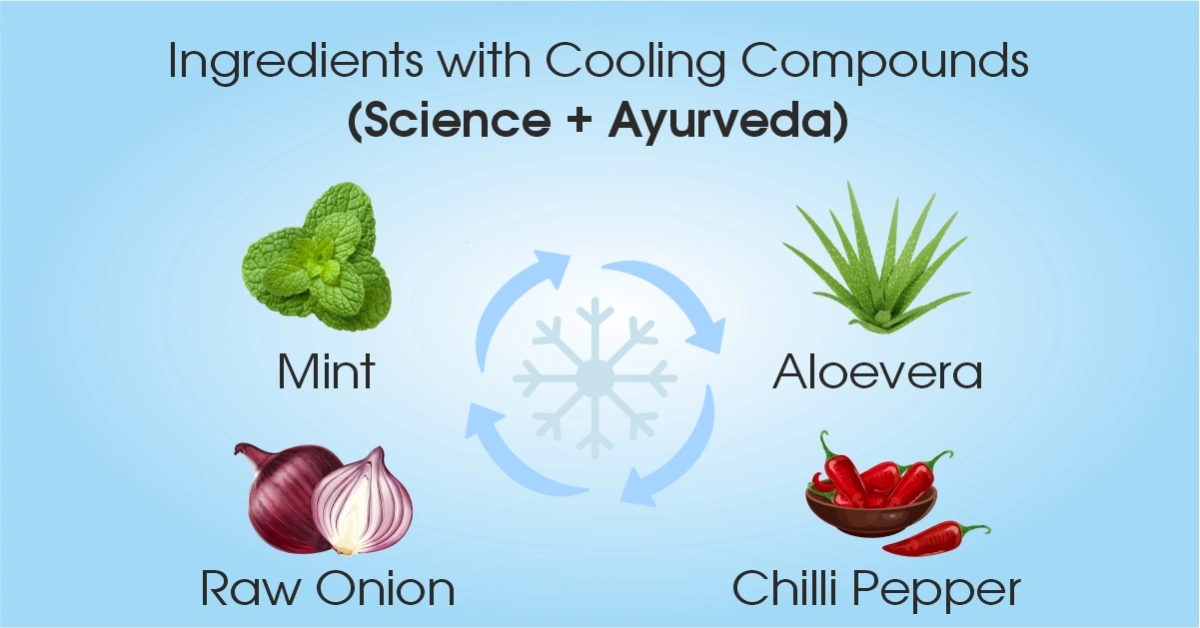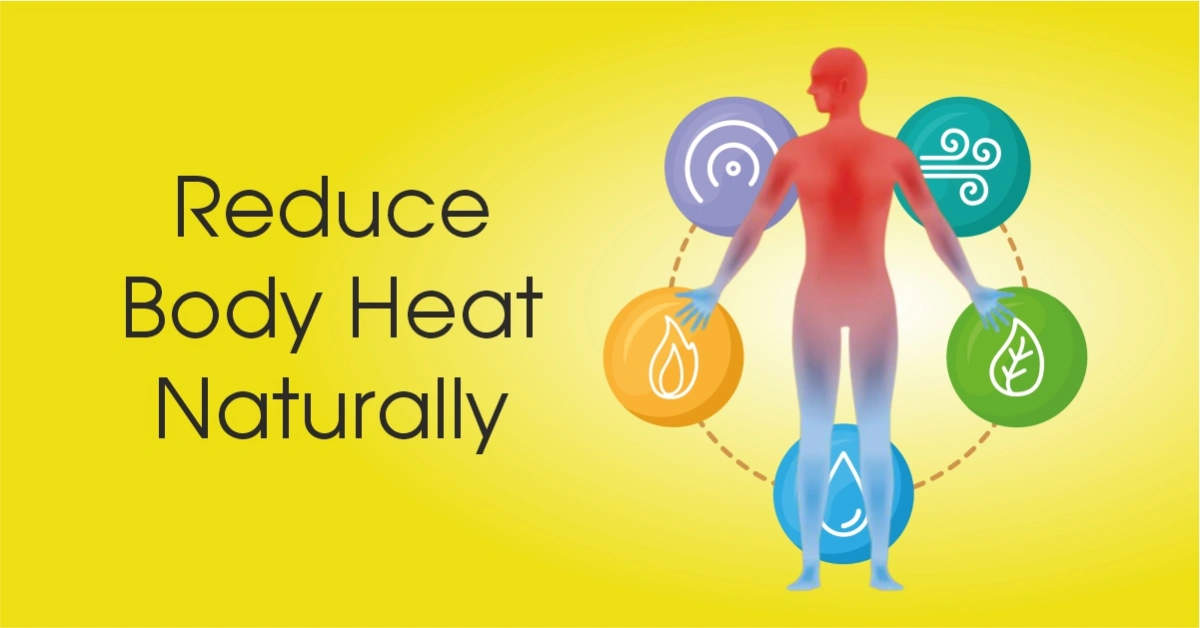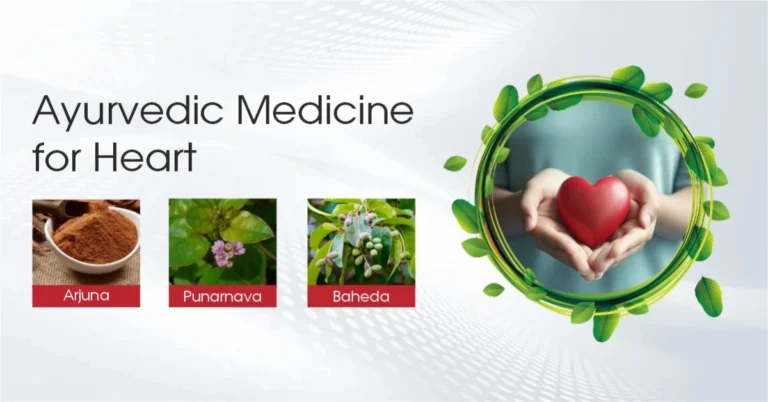How to Reduce Body Heat Naturally
In Ayurveda, our health is shaped by three doshas—Vata, Pitta, and Kapha. When it comes to body heat, Pitta dosha is the key factor. It controls digestion, body temperature, and metabolism. When Pitta is balanced, you feel energetic, calm, and clear. But when it increases, the body starts heating up from within.
This inner heat is called Agni, or digestive fire. Agni is responsible for breaking down food, absorbing nutrients, and keeping the system clean. But when Agni becomes too strong or irregular, it can cause more harm than good. The body starts producing Ama, which is undigested waste or toxins.
Ama slows down digestion and clogs internal pathways. It can lead to bloating, acidity, tiredness, or even skin issues. If Pitta and Agni are not balanced, this heat builds up and affects both body and mind.
Ayurveda doesn’t try to cool the body forcefully. Instead, it focuses on restoring balance using natural cooling substances, called Sheetal dravyas. These include herbs and foods like Amla, Gulkand, Sandalwood, and Shatavari. They calm the system, reduce internal heat, and protect digestion.
So, if you often feel hot, irritated, or restless, it may not be just the weather. It could be your Pitta asking for balance.
What Causes Excess Body Heat?
Body heat rises when small daily habits start going out of balance. Both modern science and Ayurveda agree that food, weather, routine, and mental stress are the main reasons—but they explain it in their own way.
Modern Lifestyle Triggers
In today’s fast-paced life, several things heat up the body from the inside without us even noticing:
- Dehydration: Less water means less sweating and poor heat regulation.
- Spicy or oily food: Regular intake of deep-fried, sour, or heavy meals increases body temperature.
- Alcohol & caffeine: These dry the body and disturb its cooling system.
- Stress & anxiety: Mental tension raises internal pressure, disturbing sleep and raising heat.
- Late-night routine: Staying awake till late pushes the body out of its natural rhythm.
These habits slowly disturb the body’s ability to stay cool, especially during hot months.
Ayurvedic Viewpoint

Ayurveda sees excess body heat as a Pitta imbalance, especially during Grishma Ritu (summer season). The digestive fire, or Agni, becomes unstable when we don’t live in tune with nature.
Some common Ayurvedic causes include:
- Irregular eating habits – Skipping meals or eating too late disturbs digestion.
- Pungent, salty, or sour foods – These increase the heat element in the body.
- No Dinacharya (daily routine) – Sleeping and waking at random hours confuses the body clock.
- Exertion during hot hours – Physical work during noon or using hot water for baths adds extra heat.
From an Ayurvedic angle, heat is not just a surface problem. It’s a sign that your lifestyle is pushing your body beyond its natural comfort zone.
Cooling Foods & Herbal Remedies
When the body heats up from within, the fastest way to calm it is through what you eat and drink. Ayurveda recommends using natural cooling foods, not just for relief but to restore balance. Modern science agrees—many traditional Indian remedies have real physiological benefits that help the body release excess heat and maintain hydration.
Let’s break it down into different types of cooling agents:
Hydrating Foods That Instantly Cool You Down
These foods work by keeping your fluid levels stable and helping the body sweat naturally—one of the main cooling mechanisms.
- Coconut water – Rich in electrolytes like potassium and magnesium, helps maintain temperature and prevent dehydration.
- Buttermilk – Light, easy to digest, and balances gut Pitta; a classic post-lunch summer drink.
- Cucumber – High water content + cooling nature + low calories. Helps flush out Ama.
- Watermelon – Loaded with water, lycopene, and antioxidants. Reduces internal heat and quenches thirst.
- Lemon water – Alkalizes the body and adds vitamin C while cooling down metabolism.
Ingredients with Cooling Compounds (Science + Ayurveda)

These foods may feel warm in taste (like chili) but cause the body to cool due to how they interact with your system internally.
- Mint (Pudina) – Contains menthol, which stimulates cold receptors and makes the body feel cool.
- Aloe Vera – Used in both Ayurveda and skincare; it reduces heat from inside when taken in juice form.
- Raw onion – Contains quercetin, a compound that lowers inflammation and acts as a natural coolant.
- Chili peppers – The paradox: they increase sweat through capsaicin, and that sweating cools you down.
Ayurvedic Herbs & Traditional Summer Coolants
These herbs and fruits are widely used in Ayurveda to reduce Pitta, soothe the digestive fire, and detox the blood.
| Ingredient | Ayurvedic Use |
|---|---|
| Sabja seeds | Known as “sheetal beej”; soaked and taken in milk or sharbat. Excellent coolant. |
| Bael (wood apple) | Balances Pitta and supports digestion. Bael sherbet is ideal in hot weather. |
| Kokum | Traditionally used in Konkan and coastal India to fight heatstroke. |
| Amla | Rich in vitamin C, it balances all three doshas and deeply cools the system. |
| Gulkand | Rose petal jam—sweet, cooling, and pacifies both heat and acidity. |
What Modern Science Says
Cooling is not just about temperature. It’s also about how your body manages heat loss. These remedies work by:
- Rehydrating cells
- Replenishing electrolytes lost via sweat
- Supporting hypothermic sweating (sweating that brings down internal temperature)
- Triggering skin surface evaporation, the body’s natural AC system
In other words, these age-old remedies aren’t just home tricks—they have real thermoregulation effects backed by physiology.
Quick Ayurvedic Remedies You Can Do at Home
When your body feels overheated, you don’t always need fancy treatments. A few simple combinations using ingredients from your kitchen can calm internal heat and soothe your system the Ayurvedic way.
These remedies don’t just feel refreshing—they also target Pitta imbalance, support Agni, and ease Ama buildup.
Gulkand with cold milk
A classic cooling combo. Gulkand (rose petal jam) pacifies heat in the stomach and intestines. Mix 1–2 teaspoons in a glass of cold milk and drink after lunch. It soothes acidity and improves digestion while cooling the system.
Aloe vera and cucumber smoothie
Blend fresh aloe gel with peeled cucumber, a few mint leaves, and a splash of coconut water. Take it mid-morning or as an afternoon refresher. It supports skin health, hydrates tissues, and balances fiery Pitta.
Buttermilk falooda with soaked sabja seeds
Add soaked sabja (basil) seeds into a glass of thin buttermilk. Optionally, flavor it with a pinch of roasted jeera or mint. Taken after meals, it cools the gut, prevents bloating, and promotes calm digestion.
Cooling mint and ghee face mask
Mix 1 spoon of cow ghee with crushed mint leaves and apply on the forehead or face for 10–15 minutes. This calms heated skin, reduces redness, and brings down surface-level heat—especially helpful during summer evenings.
These remedies are easy, natural, and safe for daily use. With consistent practice, they don’t just cool the body—they help restore long-term balance.
When to Seek Medical Help
While home remedies work well for mild body heat, some signs should not be ignored. If you feel constantly tired, dizzy, or confused, or notice rapid heartbeat or a lack of sweating, it may be more than just heat—possibly heat exhaustion or dehydration. These symptoms need medical attention, not just herbal care.
Dry mouth, dark urine, or a burning sensation in the body are signs your system is struggling to cool itself. In some cases, internal conditions like thyroid imbalance may be the reason. If cooling foods and lifestyle changes don’t help, it’s best to consult a doctor.
Women going through menopause may also face hot flashes. While herbs like Shatavari or Gulkand help some, they don’t work for all. If hot flashes disturb sleep or daily comfort, medical advice is safer.
Children and the elderly are more sensitive to heat. If symptoms like skin rashes, burning eyes, or digestive trouble persist, don’t wait—combine Ayurveda with proper care.
FAQs
Can hot tea help reduce heat?
Yes, it may seem odd, but hot tea can actually help cool the body. It stimulates sweat, which then evaporates and brings the body temperature down naturally.
Which fruit cools the body fastest?
Watermelon is one of the best fruits for instant cooling. It’s packed with water, electrolytes, and antioxidants that help hydrate and reduce internal heat quickly.
Is applying sandalwood powder effective?
Yes, sandalwood has strong cooling and anti-inflammatory properties. Applying it as a paste on the forehead or body helps calm surface heat and soothes irritated skin.
Can stress increase body heat?
Absolutely. Mental stress activates the nervous system, increases cortisol levels, and can lead to internal heat buildup, restlessness, and disturbed sleep.
Will using a fan increase body heat when it’s high?
In very hot and humid conditions, fans may circulate warm air and feel less effective. However, if your skin is wet or you’re sweating, fans can speed up evaporation and cool you down faster.
Which food reduces body heat?
Foods like cucumber, coconut water, amla, mint, and sabja seeds are known for their cooling effects. They hydrate the body and help pacify excess Pitta.
How can I reduce my body heat easily?
Start with hydration—drink coconut water or lemon water, eat cooling fruits, avoid spicy or fried food, and stay indoors during peak heat hours.
Which drink is best for body heat?
Buttermilk with a pinch of jeera or soaked sabja seeds is one of the most effective Ayurvedic drinks to reduce body heat naturally and support digestion.
What causes a lot of body heat?
Common causes include dehydration, spicy food, stress, irregular sleep, hot climate, hormonal changes, and Pitta imbalance in the body







